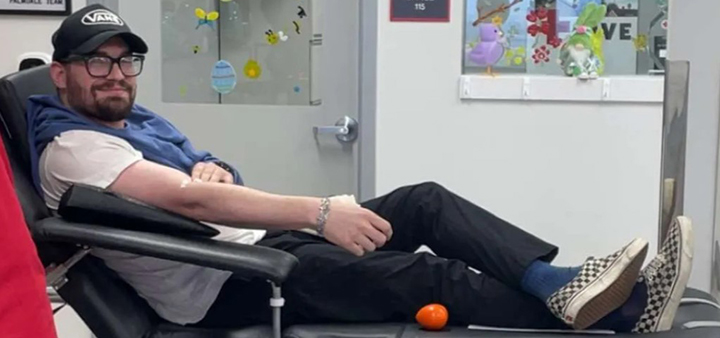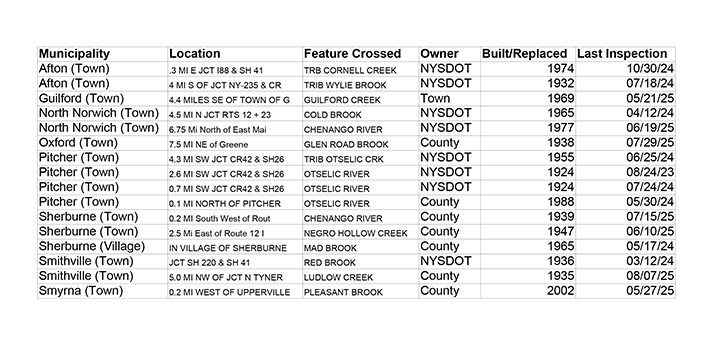Donate Blood At Upcoming Chenango County Blood Drives
Published:
August 29th, 2025
By:
Sarah Genter
 Corey, an American Red Cross blood donor, donates every year on his birthday. The Red Cross encourages all eligible individuals to consider donating blood, regardless of blood type. (Photo from the American Red Cross Blood Donors Facebook page)
Corey, an American Red Cross blood donor, donates every year on his birthday. The Red Cross encourages all eligible individuals to consider donating blood, regardless of blood type. (Photo from the American Red Cross Blood Donors Facebook page)
CHENANGO COUNTY — Several locations in Chenango County will be hosting American Red Cross blood drives this fall, where individuals can make life-saving whole blood and Power Red donations.
Upcoming blood drives include September 9 from 1 to 5:30 p.m. at the Norwich VFW Post 2782, September 10 from 11:30 a.m. to 4 p.m. at Chenango Memorial Hospital, and September 13 from 7:30 a.m. to 12:30 p.m. at the American Legion Post 376 in Oxford.
Whole blood is the most versatile type of donation, which can be “transfused in its original form, or used to help multiple people when separated into its specific components of red cells, plasma and platelets,” according to the American Red Cross.
Individuals of any blood type can make whole blood donations, which is often used to help trauma patients and patients undergoing surgery.
Whole blood donors must be at least 16 years old, weigh 110 pounds or more, and be in good health and feeling well the day of their donation.
Power Red donations involve giving a concentrated dose of red cells, often used in transfusions, given to trauma patients, individuals with sickle cell anemia, and anyone suffering blood loss. The donation process separates red blood cells from other blood components, and returns plasma and platelets to the donor.
Power Red donation is ideal for O positive, O negative, A negative, and B negative blood types. Male donors must be at least 17 years old, 5’1” tall, and weigh at least 130 pounds. Female donors must be at least 19 years old, 5’3” tall, weigh at least 150 pounds, and be in good health and feeling well on the day of donation.
Individuals will not be able to donate if they are sick or feeling unwell on the day of donation. Additionally, some medications may disqualify some donors.
Other factors that may hinder blood donation include low iron and travel to malaria-risk countries in the past three years.
More information on blood donation eligibility requirements can be found at RedCrossBlood.org/donate-blood/how-to-donate/eligibility-requirements.html.
After donating blood, the Red Cross explains blood is then sent to a processing center, where “most whole blood donations are spun in centrifuges to separate it into transfusable components: red cells, platelets, and plasma.” Plasma, red cells, and platelet donations are also often separated into their different components.
In addition to donating about a pint of blood, several vials are also taken from donors and sent for testing to determine blood type and to check for infectious diseases. Any samples that test positive will result in the donation being discarded. Donors will also be notified, and the Red Cross said “our test results are confidential and are only shared with the donor, except as may be required by law.”
After testing, blood donations are then distributed to hospitals, 24 hours a day every day of the week. From there, they are used in treatment of patients and potentially life-saving care.
“Blood transfusions are given to patients in a wide range of circumstances, including serious injuries (such as in a car crash) surgeries, child birth, anemia, blood disorders, cancer treatments, and many others,” states the Red Cross.
Blood donations may also be used to help anemia patients by transfusing red blood cells; platelets may be used for patients who are unable to make enough platelets; and plasma transfusions can be used to treat patients with liver failure, severe infections, and serious burns.
According to the Red Cross, only 3 percent of eligible donors donate blood each year. The organization urges everyone to consider donating blood, regardless of blood type.
“Perhaps you’ve heard an appeal for donors that says we’re running low on certain blood types. That doesn’t mean other types aren’t valuable: there’s always a need and purpose for every type of blood,” said the Red Cross.
For more information on donating blood, visit RedCrossBlood.org.
Author: Sarah Genter - More From This Author
Comments









